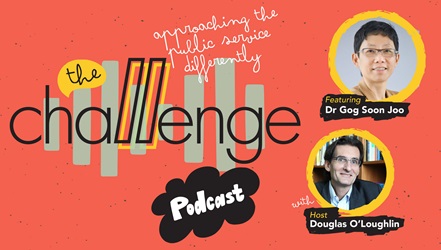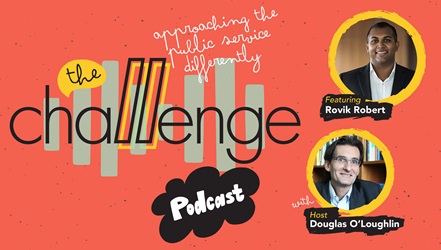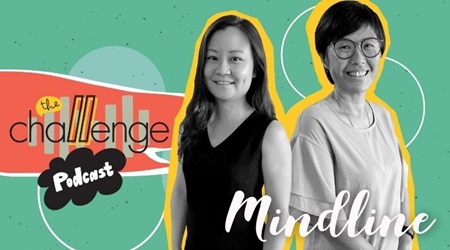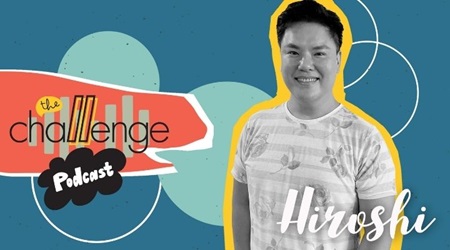Dr Noraslinda Zuber and Dr Moira Lee on Charting Career Paths
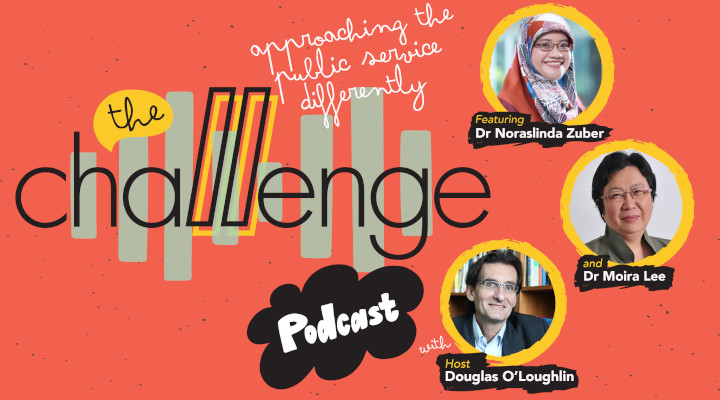
For this episode, Challenge hears from two Public Service Career Coaches: Dr Noraslinda Zuber from MUIS and Dr Moira Lee from Temasek Polytechnic. They give us an insight into what career coaches do, and not do, and shared tips on how to navigate your career.
Transcript
Host: Douglas O’Loughlin
Audio: Fei
Douglas: Hello and welcome to the Challenge podcast where we discuss all things Public Service in Singapore. I'm your host, Douglas O'Loughlin, a consultant in organisation transformation and a former public officer. And for this podcast, we'll be speaking to public officers on a wide range of backgrounds.
Today on the Challenge podcast, we have not one but two guests. Both of them are Public Service Career Coaches in the Public Service Career Coach Network. We have Dr Noraslinda Zuber, who is Director of Human Capital at the Islamic Religious Council of Singapore or MUIS. And Dr Moira Lee, who is a lead specialist involved in coaching, mentoring and teaching at Temasek Polytechnic. So welcome Dr Nora and Dr Moira, welcome to our podcast. Thank you so much for being here.
Dr Nora: You're welcome. It's a pleasure to be here.
Dr Moira: Glad to be here.
Douglas: Why don't we start with a general idea of what career coaching is all about? Dr Nora, you want to want to get us going?
Dr Nora: Yeah, sure, Douglas. Basically, a coach is someone who supports and guides another individual in achieving a specific personal or professional goal. And a career coach in particular focuses on the professional aspect of an individual's career and work.
Douglas: Okay, that's a good start. And Dr Moira, you want to add anything to that?
Dr Moira: Yep, when I think of what a career coach does, my mind immediately goes back to the acronym, G-R-O-W, Grow. It’s a very common acronym in the coaching arena. So for me, a coach attempts to help the client think of the goal that the client wants for herself, for himself. To have that goal very clear in mind, the R stands for realities: what are the current realities, what are the future realities, at least the near-future realities. The O stands for the options for the client. Sometimes people say the O should also be about exploring obstacles. But let's talk about the options, we typically would ask the client to consider a range of these. The W stands for the way forward: how do I get to the goal that I have placed before myself? So to me, in a nutshell, that's what a career coach attempts to do – help the client grow.
Douglas: Well, nice. So maybe you can each share how you got into this work in the first place, and maybe some idea of the typical kind of folks who come to you for career coaching advice?
Dr Nora: I have been in the HR field for a long time. And I've always been interested in being able to converse with different individuals to find out more about them and what they enjoy doing with regard to their lives. And in the last two years, I decided to embark on a certification journey of coaching, because I thought that having a certain kind of training would be very helpful in my role as an HR person. And once I started, I found tremendous joy in being able to do coaching, both career coaching, as well as developmental coaching. And it's been a blast for the past two years or so. And I'm very fortunate and blessed to be part of the Public Service Career Coach Network. Those who come to talk to me are primarily the slightly younger public officers who may have just started in their roles, perhaps as middle managers, and also those who are trying to figure things out in the first part of their career.
Douglas: Dr Moira, what about you?
Dr Moira: I joined Temasek Polytechnic in 2001. So it's been 20 years, and I'm still fully employed in Temasek Polytechnic as a re-employed staff after I reached 62. I was very involved in academic staff development, what we call internal teacher training. I was the director for 12 years. When I reached 60, I felt that it was time to step down. I felt that there was a colleague who was more than ready to step into my shoes and do a better job than I ever did. So for myself at that point, it was wonderful that Temasek Polytechnic had the foresight and the heart to suggest that I get a formal certification in coaching. The demographics of the people I have been coaching thus far across the Public Service have, understandably, included people who are considering early retirement, or what they can do towards the last chapter of their careers. But like Dr Nora, I also have a wide range. So we have the ones who are very young, the ones who are looking for purpose in their work life, but it is definitely across the whole span of ages.
Douglas: You've kind of both touched on this a little bit, but can you share a little bit more about the typical issues that people come to you for?
Dr Moira: Okay, I'll start off on this one. As I reflect on actual cases, the most common issue that I have faced, let's say in the past year, has been clients saying: I feel stagnant in my workplace, I feel that I have reached a plateau, I am wondering how I can be further developed. So basically the word stagnation comes to their minds. How do I respond to that?
I have come up with three Rs. The first thing I say to them before the three Rs is please take time to pause and reflect – happens to be an R there – on their own sense of responsibility. How are they really contributing to their particular organisation? Handle your current responsibilities well, and more will be given to you. The second R is to cultivate a sense of resilience. Have patience, and recognise that your leaders may need time to give you the right assignment, recognise that you may need time to be able to identify right assignments for yourself. And finally, I tell them, let's be realistic. And that's the third and final R. Meaning to say, I can't feel on top of the world at work everyday. I cannot expect exciting projects all the time, but to understand that there will be times that are ordinary, but ordinary is also fine. So, be realistic about expectations. That's how I try to handle this feeling of ‘I feel stagnant’.
Douglas: What about you, Dr Nora?
Dr Nora: Thanks, Moira. I would need to remember the three Rs – it’s a very useful framework. For me, one of the main questions clients ask is about staying motivated in what they are doing. Because the demographic tends to be slightly younger, they do know it's important for them to be able to be productive and be able to do their job well. So the first thing I ask is, what keeps you going? Because from that very simple question, they will pause, reflect a bit more about the little things they are doing today that provides enjoyment and fulfilment. And oftentimes, based on my own experience, when I ask these questions, they get a chance to articulate whatever is in their mind and heart.
From there we narrow down to what exactly it is they are facing that is making them feel demotivated. Sometimes it’s as simple as being unsure about what they are doing, their contributions to their job, and from there they will start to realise that they could speak to their supervisors about the issue: Why am I doing this? How does this add value to the larger vision or purpose of the organisation or the teams?
Douglas: Actually, this is something all of us can do on a daily basis: check in with what brings us joy, what we enjoy and what we don't, and really pay attention. It sounds like a way to build self-awareness for that career development.
Dr Nora: Yeah, absolutely. Even for myself. It's not every day that you wake up raring to go to work, but it's about what keeps me going. And I'm very clear that what keeps me going is that ability and opportunity to interact with people, because that's my passion. I love interacting with people, I love wanting to see how else I can help them, grow them, and develop them. And if you have problems, and if I'm the supervisor, let's see what we can do to resolve whatever challenges you're facing.
Douglas: And I've seen you do that.
Dr Nora: Thank you.
Dr Moira: One of the things which is triggered in my mind from hearing Dr Nora is that I have noticed a good number of people struggle with this issue of not being good enough. That sense of, why am I not promoted? And one of the things that I wish all of us, and our listeners, to be mindful of is if you're going to wait solely for external affirmation, you might be disappointed. And what I say to my clients is they need to find that sense of resilience, find that sense of inner security. If you know that you have tried your very best, if you know that you have given all that you can, then I would say find that significance in who you are as a person, not just by whether you get that pay rise or not. I am not advocating mediocrity, I would like us to all have excellence. But I am saying let's be realistic. And let’s find that inner sense of security.
Douglas: Speaking of advice, what kind of things would you recommend that people do on a regular basis to think about their careers? Do either one of you have some career hacks?
Dr Nora: For me, it's always about having clarity. Break it down into your immediate, your mid term and your long term (goals). When you break it down into these three buckets, you would be able to figure things out in a slightly smaller scale. For the immediate bucket, today, what is it that you need to do, what can you do? Similarly in the mid term and the long term. So that's one of the career hacks, so to speak, that I think is very important and very useful.
I get my client to visualise and draw on a blank sheet of A4-sized paper. They draw where they're at today at one corner of the page, and draw the vision, or where they want to be, at the other corner. From there, they map their journey: what is it that needs to be done? Do you need new skills? Do you need new qualifications? Or do you need to speak to your boss to figure things out in terms of your next posting, your next movement? When you have that visualised, you can then really map out what it is that you want to do and need to do to achieve that vision or that goal.
Dr Moira: I think Nora has given to us a very methodical way of planning one’s careers. One of the very clear and often repeated, I would say, career advice that I give to my colleagues is this: attitude. Attitude is as important as aptitude. Oftentimes in an interview, and I'm thinking of one particular situation, the person is impressive with regard to his experience and credentials, so we get the person in. Within two weeks, the attitude of minimal work, [minimal] effort, the attitude of ‘I know better’ than even one of the longstanding leaders – I found that to be very disappointing. In contrast, you have somebody who may not be your grade A worker, grade A performer, but has humility. Their attitude is one of, I would like to learn more, I'm sorry I made the mistake, I'd like to do better. That person can go far. So if you asked me for one of the many career tips that I can think of, the one that stands out to me is attitude is perhaps as important or more important than aptitude.
Douglas: In the meantime, some people might be in work situations now, some of our listeners, for example, where their work environment is not ideal. Maybe they get off to a bad start, or they don't feel they're getting on with their bosses or they don't feel like they can handle the work – difficult circumstances in some form. What advice would you have on how to manage these situations?
Dr Moira: I would say firstly, you might want to consider your perception of the difficult situation. It is possible that we over-exaggerate, somewhat, how difficult it really is, it is possible that we don't have all the pieces of the puzzle. So I would say to the person: Firstly, what makes you feel that that environment is so difficult? How might it be possible for you to be the solution to the difficult situation that is at hand?
But at the same time, we have to recognise there are times when clients feel so burnt out, so petrified almost, at the thought of going to work. I would tell this person to plan – plan what you can do to possibly turn the situation around. At the same time, plan if an exit is necessary. How is that to be done? What are your options? So I would say the two Ps there would be perspective of the difficult circumstance and planning as to what you could do to either see a change that could come about in your circumstance, or plan for an exit. But do this in the right manner, so that there is no impulsive and hasty decision. To just walk out would not be the best scenario. Nora, any thoughts on that?
Dr Nora: Yeah. As you were speaking, what came to my mind was this: often the client is so immersed in a challenging situation that it appears to be without hope. And as a coach, I see myself as being that vessel for them to just offload their problems. And so in such a situation, I would give them the chance to just articulate and talk it out. At an appropriate moment, just like you, I would ask questions: Are you the player here, or are you the victim? What kind of role are you playing in this situation? It is to get them to pause and reflect, and to see whether the situation is really as hopeless and as bad as they think and feel it is. So they articulate what they need to say, and because they do not know me, it’s a very safe space. So they can say all sorts of things and they know it is going to remain confidential. After they have done that, I do the same as Moira, which is to ask them to re-frame and have another perspective of the situation, to see whether there is something they can do.
Often, they will come to the realisation that they need to speak to their direct supervisors because there is indeed something that is bothering and affecting them. And as Moira said, the person doesn't want to go to work, and yet the person needs the job, right? So there needs to be some solution or action that needs to be taken. It's painful, frankly, because they could be in such a terrible place, because they feel so lost. And it could also feel that they're so victimised.
Dr Moira: I think for us, as coaches, one of the qualities that is important is empathy. And yes, as Nora has said, I think we want to give a listening ear to our clients. That's necessary. That's only right. But at the same time, I'm also very conscious that as a coach, our role is really to raise the questions that will cause them to pause and think. So we've been often reminded, even in our coaching courses, not to be afraid of silence. Because people need time, a little while to just ponder and think. So when I start the first session with each client, I would ask them about their understanding of coaching. And sometimes they say, oh, the coach gives me all the right answers. Then I say, that’s not me. But I get them to a point of recognising that my role as a coach is to ask the difficult questions to cause them to think. We ask questions about the things that make them feel the way they do: How has the situation become what it is? We tend to ask the ‘how’, and the ‘what’ questions. So yes, empathy, but at the same time, challenging them to think more deeply.
Douglas: So I guess it's a skill to know when to give somebody a hug and when to give a nudge, or when to give both at the same time.
Dr Nora: I have seen occasions where my clients actually cried. It’s difficult for me because I'm like, okay, the client is crying, but it's still the silence that I hold onto. Because that's when you know the client is deeply processing. And honestly, I always believe that coaching, be it career coaching or developmental coaching, is really a safe space. It is a space where we honour the client's thoughts, thinking, feeling, emotions.
Dr Moira: Right at the beginning, you asked us what we do as career coaches, and I used the acronym GROW. But another two words that often come to my mind on this matter is that we're there to provide challenge and support. I like the two words: challenge and support. I think one without the other would not be appropriate.
Douglas: So as we start to wrap up this very enlightening session, we hope that everyone's gotten some reminders or ideas here. Would either of you like to share a little bit of your closing thoughts for everyone?
Dr Nora: Okay, maybe I can start off first. There's something that I always tell my clients, which is this: You are the person in charge of your own career. No one cares more about your career than you. In so much as you want your employers and bosses to help you in your career journey, you must take ownership. And if you think that there's something not quite right, pause, reflect, figure that out, and plan your next steps.
Dr Moira: I really like the word ownership. In line with that, I think my final wrap-up word would be to think about not just how well you begin, but also how well you end. And somebody just recently reminded me it's also the journey that we all take. When I joined Temasek Polytechnic, the end never seemed to be so immediate, but 20 years have gone by. And the end has come for me in terms of official retirement age. But my own concern has always been how will I end? How will I end the journey? And it's for all of us, therefore, to give our very best, find that sense of confidence that we can be what we set out to be, and to have a good number of colleagues who will stand with us. So that together we can make our workplace a lot more meaningful, a lot more purposeful. So yes, start well, end well, journey well.
Douglas: Very nice words of wisdom to finish. Thank you both.
Dr Moira: It's been a pleasure.
Dr Nora: Yeah. It's been a pleasure, Doug.
Douglas: If you would like to receive email updates on public service career coaching services for public officers, you can go to go.gov.sg/psccnform. We wish you all the best for an enriching career.
Thank you for listening to this podcast. I’m your host Douglas O’Loughlin. Follow us for new episodes, and follow psd.gov.sg/challenge for more public service stories.

To hear more conversations like this, follow the Challenge Podcast on Spotify.
- POSTED ON
Jun 24, 2021
- TEXT BY
Keval Singh
-
Season 2: Mental Wellbeing
Mindline.SG and the Road To De-stigmatising Mental Health Issues
-
Season 2: Mental Wellbeing
The Case for Employee Wellbeing




